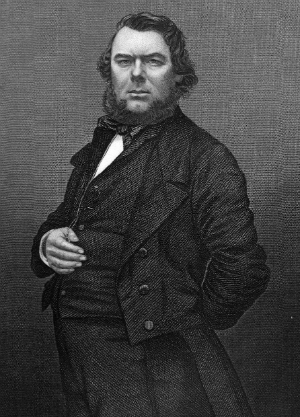Israel Olofinjana’s
Baptist Times article about John Wilson had many resonances with me. At the same time that Wilson was preaching the gospel and caring for the poor in Woolwich, another Baptist minister was doing the same in Liverpool, And he, too, has a road named after him. After his death they even raised a statue in his honour, funded by public subscription.

The Liverpool preacher was Hugh Stowell Brown and from the time he first came to Liverpool in 1847 as a young man of twenty four, to his death forty years later, he led the cause of gospel preaching and Christian social action in what was then the second city of the British Empire and the world’s first global city.
Brown was not English, but a proud Manxman, born in the island’s capital, Douglas, the son of a low church Anglican minister. Brown’s father was never convinced of the value of infant baptism and when Hugh went to study to be a Church of England minister his conscience wouldn’t allow him to continue. He abandoned his training and became a Baptist.
He went across the water to England, passing through Liverpool on the way, to work as a civil engineer. He was part of the early work of the Ordnance Survey and all OS maps of York are based on his work as a young man. He then worked as a railway engineer in Wolverton, and was baptised at Stony Stratford Baptist Church.
When Brown first went to Myrtle Street Baptist Church in Liverpool he was there to take morning and evening services during a pastoral vacancy, but something about the young man appealed to the congregation and they invited him to stay. Before long they asked him to be their minister. He had a place to study at Bristol Baptist College but he never went there, and with minimal training and very little experience he became minister of one of the largest churches in Liverpool town centre.
Through Brown’s forty years at Myrtle Street the church grew every year and saw hundreds of baptisms. The church building was enlarged twice and grew in reputation. What made Myrtle Street attractive was Brown’s preaching, which was lively and Biblical and most of all down-to-earth, full of topical references and suggestions for practical living the life of faith.
The church attracted the educated and the well-to-do. Brown’s daughter married the politician William Sproston Caine, a member of the church. Caine, like most Baptists of his time, was a Liberal and served in Gladstone’s government.
Liverpool was a town of great poverty, especially after the wave of Irish immigration that followed famines there. Brown realised that the poor were not well represented in the church, and discovered that this was mainly because they felt they could not attend church without wearing their “Sunday best”, and they had no suitable clothing. So Brown started a series of “lectures for the working men of Liverpool” in a public hall.
These were held on a Sunday afternoon and had many of the hallmarks of a church service, but because the meetings were not in church, there was no expectation of dressing well. Brown noted with great pleasure how many, both men and women, turned up in their working clothes. Up to three thousand people would come along each week to hear this witty and plain-speaking Manxman talk about gambling and abstinence and family life and the state of the nation, and always about his Lord Jesus.
The success of the lectures led to Brown’s reputation spreading. He travelled all over Britain to preach, and later went to America and Canada. He was known as a friend of the poor and he founded a Workman’s Bank where those without wealth could have access to banking facilities so they could save their money and budget properly.
Brown worked for the abstinence movement among people afflicted by drunkenness, and founded a society to help the widows of seafarers. In 1878 Brown became president of the Baptist Union. His writings show that Brown was a man of good humour, though he also seems to have had a streak of arrogance and because of the grinding poverty of his childhood he never felt he had quite enough money, although by 1880 he was the best paid Baptist minister in the country.

Myrtle Street Baptist Church didn’t just grow in number; it was active in church planting. When people travelled from many miles around to come to his church, Brown worked with them to plant Baptist churches where they lived. Myrtle Street became the mother church of Baptist churches across Liverpool and in Birkenhead, Wallasey, St Helens, Warrington and further afield. By the time of Brown’s death in 1886 what most pleased him was the growth of God’s church through multiplication.
And I said he had a road named after him. Stowell Street was named in his honour when it was built alongside Myrtle Street Chapel. It seems that Hugh Stowell Brown was never consulted about the street designation and he wrote in his common place book, “a very small mean street… is called Stowell Street – I think with reference to me”.
Small and mean it may be, but it bears witness to a man whose life touched the lives of many with compassion and gospel truth.